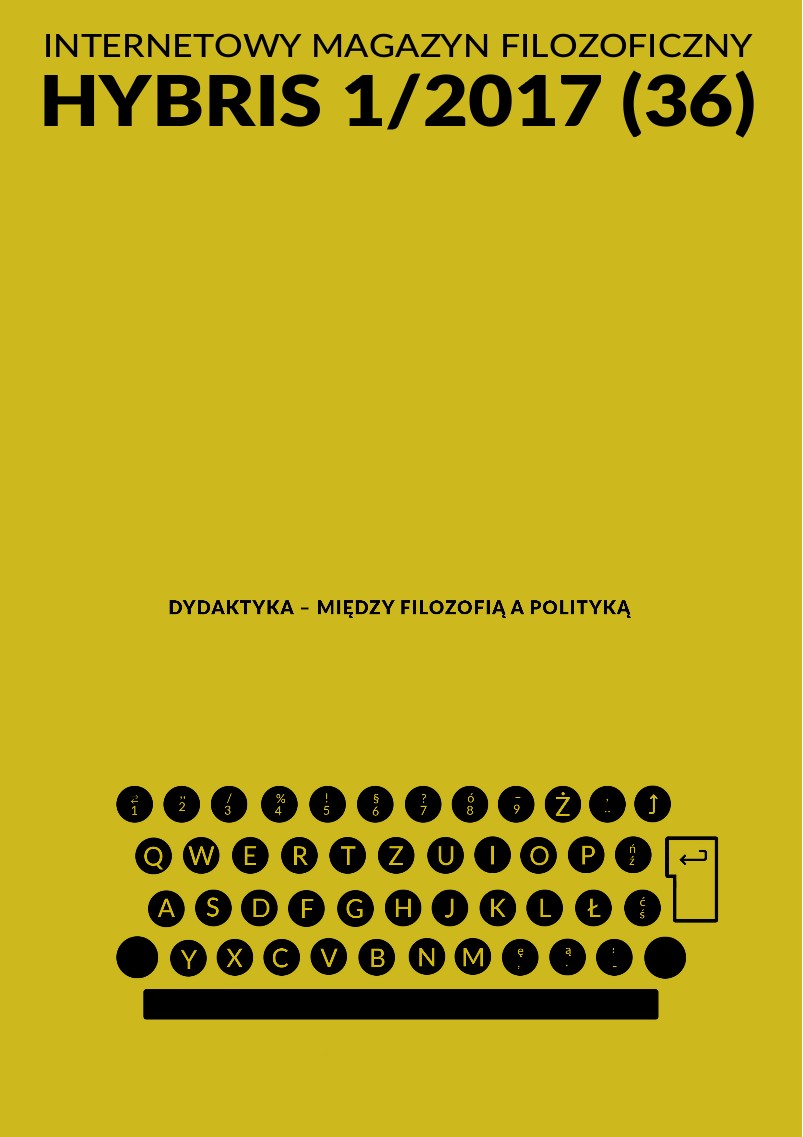Paradygmaty edukacji liberalnej w filozoficznej eksploracji Daniela Denicoli
DOI:
https://doi.org/10.18778/1689-4286.36.06Słowa kluczowe:
edukacja liberalna, kształcenie ogólne, paradygmaty edukacji liberalnej, dobre życie, rozkwit człowieka, uczenie się, transmisja kulturyAbstrakt
The text presents thoughts of American philosopher of education Daniel R. DeNicola on liberal education contained in his book under the title „Learning to Flourishing. A Philosophical Exploration of Liberal Education”, published in 2012. He describes education realised in American Liberal Arts Colleges. Analysing paradigms in which liberal education developed and created its long and differentiated tradition, starting from the transmission of culture up to the skills of learning, DeNicola argues that none of them lost their validity. Building the thin (not thick) normative theory of liberal education aimed at the flourishing life, he states that we can still recall them all and rebuild the sense of that education. Its axiological distinctive features are freedom, autonomy, democracy and truth. DeNicola’s proposition is worth of discussing in Polish pedagogy where the prevalent equivalent of liberal education is general education. The main aims of the text are to strengthen the philosophical argument in favour of understanding general education more linked to liberal education because of its liberal elements, consequently to renew the sense of education as whole and finally to strengthen didactics philosophically.
Bibliografia
Berlin, Isaiah, 2004, Pokrzywione drzewo człowieczeństwa, przeł. Magda Pietrzak–Merda, Maciej Tański, Warszawa: Prószyński i S–ka.
Zobacz w Google Scholar
DeNicola, Daniel, 2012, Learning to Flourish. A Philosophical Exploration of Liberal Education, New York London: Continuum International Publishing Group.
Zobacz w Google Scholar
Dewey, John, 1997, Experience and Education, New York: Touchstone.
Zobacz w Google Scholar
Elzenberg, Henryk, 2005, Wartość i człowiek, Toruń: Wydawnictwo Naukowe UMK.
Zobacz w Google Scholar
Kohlberg, Lawrence, Mayer, Rochelle, 1993, Rozwój jako cel wychowania, [w:] Zbigniew Kwieciński, Lech Witkowski (red.), Spory o edukację. Dylematy i kontrowersje we współczesnych pedagogiach, Warszawa: Instytut Badań Edukacyjnych, ss. 51–95.
Zobacz w Google Scholar
Kozłowski, Władysław, 1932, Co i jak czytać?: wykształcenie samego siebie i czytelnictwo metodyczne, Warszawa: Gebethner i Wolff.
Zobacz w Google Scholar
Marrou, Henri–Irénée, 1969, Historia wychowania w starożytności, przeł. Stanisław Łoś, Warszawa: Państwowy Instytut Wydawniczy.
Zobacz w Google Scholar
Mill, John Stuart, 1931, The Inaugural Address at St. Andrews, [w:] Francis Alexander Cavenagh (red.), James & John Stuart Mill on Education, Cambridge: University Press, ss. 132–208.
Zobacz w Google Scholar
Nussbaum, Martha, 2008, W trosce o człowieczeństwo. Klasyczna obrona reform kształcenia ogólnego, przeł. Astrid Męczkowska, Wrocław: Wydawnictwo Naukowe Dolnośląskiej Szkoły Wyższej.
Zobacz w Google Scholar
Oakeshott, Michael, 2001, The Voice of Liberal Learning, Indianapolis: Liberty Fund.
Zobacz w Google Scholar
Peters, Richard Stanley, 1964, Education as Initiation, London: Evans Bros., for University of London Institute of Education.
Zobacz w Google Scholar
Sajdak, Anna, 2013, Paradygmaty kształcenia studentów i wspierania rozwoju nauczycieli akademickich. Teoretyczne podstawy dydaktyki akademickiej, Kraków: Oficyna Wydawnicza „Impuls”.
Zobacz w Google Scholar
Whitehead, Alfred North, 1967, The Aims of Education and Other Essays, New York: Free Press.
Zobacz w Google Scholar
Wrońska, Katarzyna, 2014, „Liberal education” w Polsce. Między kształceniem ogólnym a edukacją liberalną, „Paedagogia Christiana”, 33, ss. 11–28.
Zobacz w Google Scholar
Wrońska, Katarzyna (red.), 2014, Liberal Education, “Paedagogia Christiana”, 33.
Zobacz w Google Scholar
DOI: https://doi.org/10.12775/PCh.2014.001
Pobrania
Opublikowane
Jak cytować
Numer
Dział
Licencja

Utwór dostępny jest na licencji Creative Commons Uznanie autorstwa – Użycie niekomercyjne – Bez utworów zależnych 4.0 Międzynarodowe.






